Accounting Theory and Contemporary Issues: AI Impact and Solutions
VerifiedAdded on 2020/05/28
|16
|3530
|89
Report
AI Summary
This report investigates the transformative impact of Artificial Intelligence (AI) on the accounting profession, aiming to dispel fears and highlight opportunities. It explores how AI, through machine learning and automation, is changing accounting practices, offering enhanced efficiency, data analysis capabilities, and marketing opportunities. The report defines AI, identifies key contributors, and examines the software and tools used. It details the benefits of AI, such as automation of tasks and deeper client data analysis. However, it also addresses potential threats like the need for additional costs for setup and the risk of job displacement. The report emphasizes the importance of embracing AI to remain competitive, suggesting a synergy between AI software and human expertise for optimal outcomes. It concludes by advocating for the adoption of AI to drive organizational growth and development in the accounting field, providing valuable insights for stakeholders to understand the future of the industry.
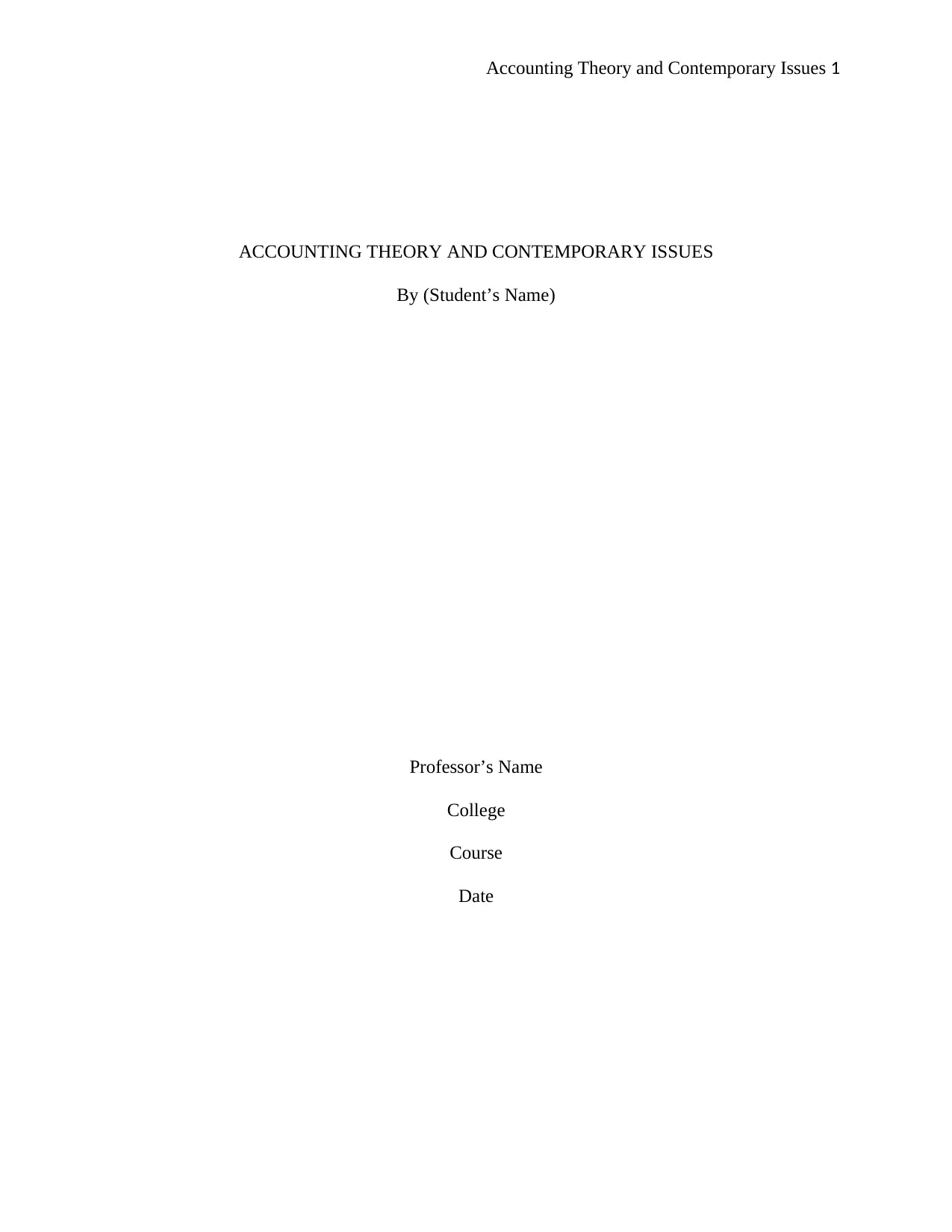
Accounting Theory and Contemporary Issues 1
ACCOUNTING THEORY AND CONTEMPORARY ISSUES
By (Student’s Name)
Professor’s Name
College
Course
Date
ACCOUNTING THEORY AND CONTEMPORARY ISSUES
By (Student’s Name)
Professor’s Name
College
Course
Date
Paraphrase This Document
Need a fresh take? Get an instant paraphrase of this document with our AI Paraphraser
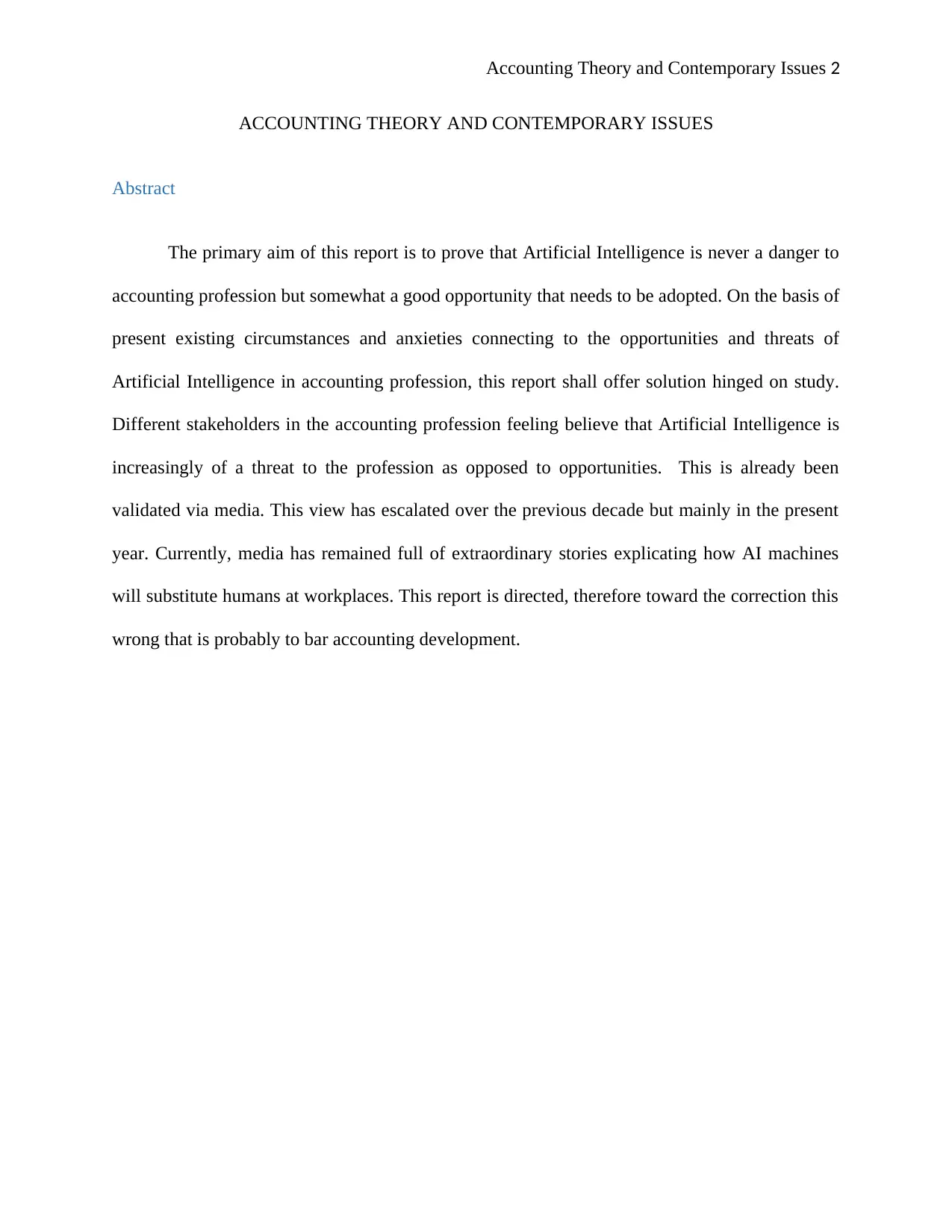
Accounting Theory and Contemporary Issues 2
ACCOUNTING THEORY AND CONTEMPORARY ISSUES
Abstract
The primary aim of this report is to prove that Artificial Intelligence is never a danger to
accounting profession but somewhat a good opportunity that needs to be adopted. On the basis of
present existing circumstances and anxieties connecting to the opportunities and threats of
Artificial Intelligence in accounting profession, this report shall offer solution hinged on study.
Different stakeholders in the accounting profession feeling believe that Artificial Intelligence is
increasingly of a threat to the profession as opposed to opportunities. This is already been
validated via media. This view has escalated over the previous decade but mainly in the present
year. Currently, media has remained full of extraordinary stories explicating how AI machines
will substitute humans at workplaces. This report is directed, therefore toward the correction this
wrong that is probably to bar accounting development.
ACCOUNTING THEORY AND CONTEMPORARY ISSUES
Abstract
The primary aim of this report is to prove that Artificial Intelligence is never a danger to
accounting profession but somewhat a good opportunity that needs to be adopted. On the basis of
present existing circumstances and anxieties connecting to the opportunities and threats of
Artificial Intelligence in accounting profession, this report shall offer solution hinged on study.
Different stakeholders in the accounting profession feeling believe that Artificial Intelligence is
increasingly of a threat to the profession as opposed to opportunities. This is already been
validated via media. This view has escalated over the previous decade but mainly in the present
year. Currently, media has remained full of extraordinary stories explicating how AI machines
will substitute humans at workplaces. This report is directed, therefore toward the correction this
wrong that is probably to bar accounting development.
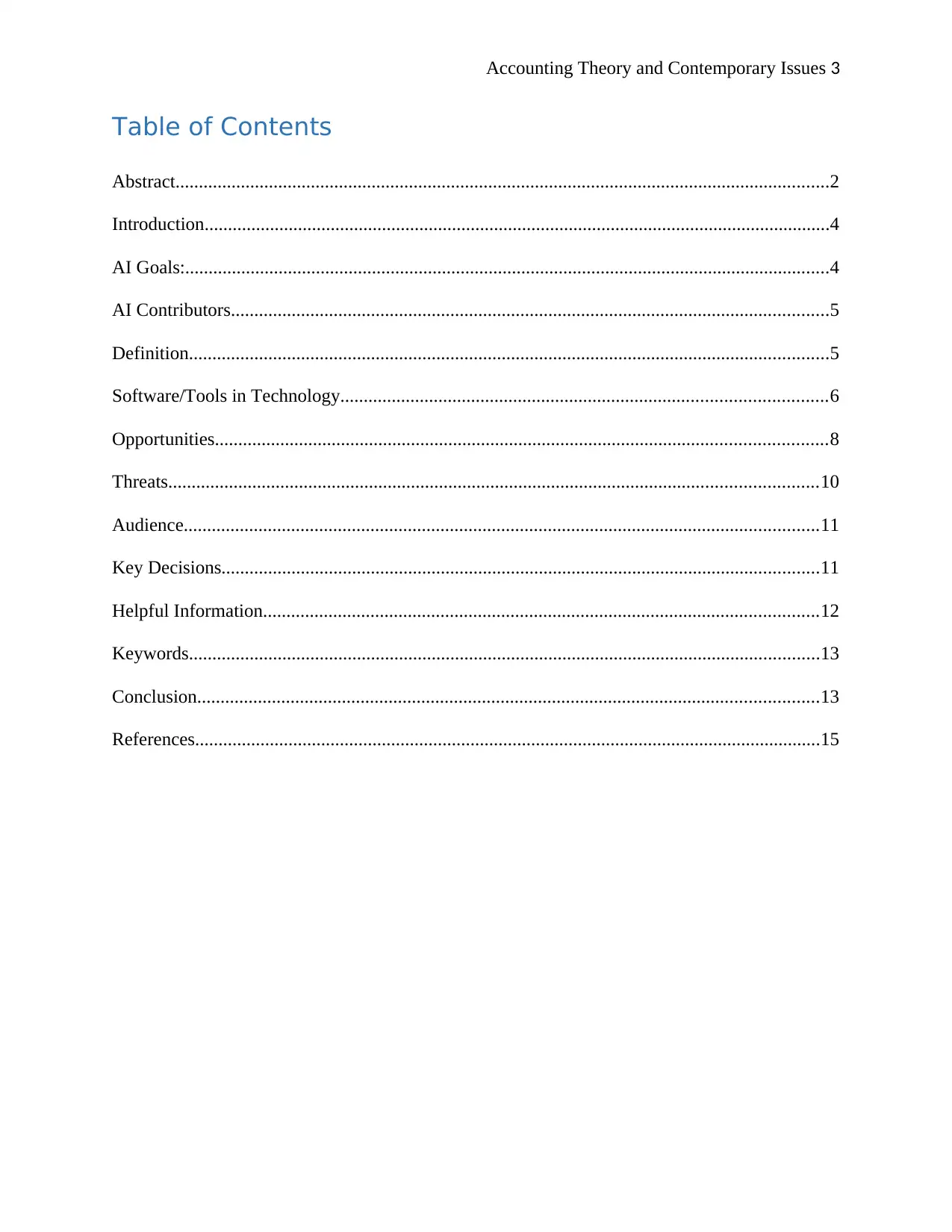
Accounting Theory and Contemporary Issues 3
Table of Contents
Abstract............................................................................................................................................2
Introduction......................................................................................................................................4
AI Goals:..........................................................................................................................................4
AI Contributors................................................................................................................................5
Definition.........................................................................................................................................5
Software/Tools in Technology........................................................................................................6
Opportunities...................................................................................................................................8
Threats...........................................................................................................................................10
Audience........................................................................................................................................11
Key Decisions................................................................................................................................11
Helpful Information.......................................................................................................................12
Keywords.......................................................................................................................................13
Conclusion.....................................................................................................................................13
References......................................................................................................................................15
Table of Contents
Abstract............................................................................................................................................2
Introduction......................................................................................................................................4
AI Goals:..........................................................................................................................................4
AI Contributors................................................................................................................................5
Definition.........................................................................................................................................5
Software/Tools in Technology........................................................................................................6
Opportunities...................................................................................................................................8
Threats...........................................................................................................................................10
Audience........................................................................................................................................11
Key Decisions................................................................................................................................11
Helpful Information.......................................................................................................................12
Keywords.......................................................................................................................................13
Conclusion.....................................................................................................................................13
References......................................................................................................................................15
⊘ This is a preview!⊘
Do you want full access?
Subscribe today to unlock all pages.

Trusted by 1+ million students worldwide
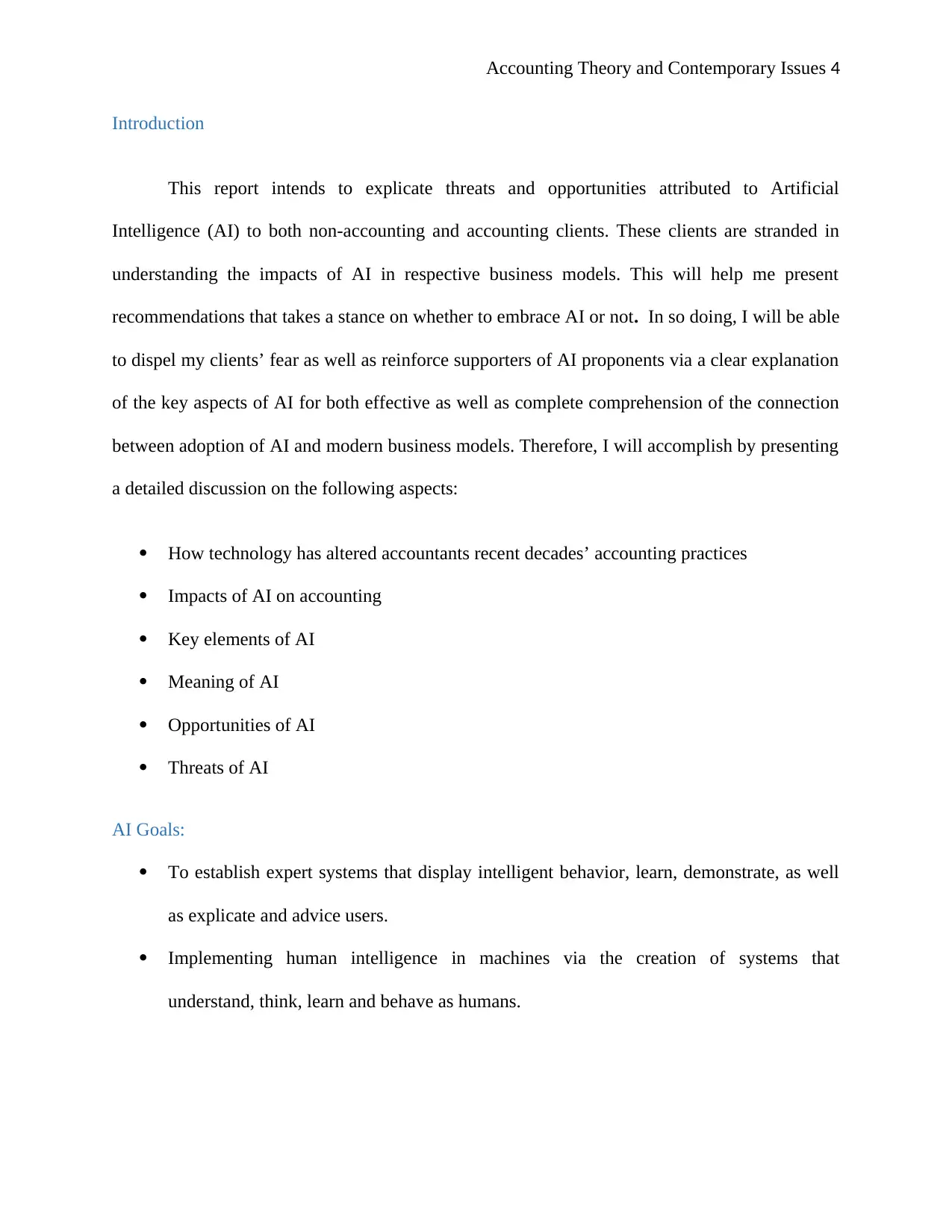
Accounting Theory and Contemporary Issues 4
Introduction
This report intends to explicate threats and opportunities attributed to Artificial
Intelligence (AI) to both non-accounting and accounting clients. These clients are stranded in
understanding the impacts of AI in respective business models. This will help me present
recommendations that takes a stance on whether to embrace AI or not. In so doing, I will be able
to dispel my clients’ fear as well as reinforce supporters of AI proponents via a clear explanation
of the key aspects of AI for both effective as well as complete comprehension of the connection
between adoption of AI and modern business models. Therefore, I will accomplish by presenting
a detailed discussion on the following aspects:
How technology has altered accountants recent decades’ accounting practices
Impacts of AI on accounting
Key elements of AI
Meaning of AI
Opportunities of AI
Threats of AI
AI Goals:
To establish expert systems that display intelligent behavior, learn, demonstrate, as well
as explicate and advice users.
Implementing human intelligence in machines via the creation of systems that
understand, think, learn and behave as humans.
Introduction
This report intends to explicate threats and opportunities attributed to Artificial
Intelligence (AI) to both non-accounting and accounting clients. These clients are stranded in
understanding the impacts of AI in respective business models. This will help me present
recommendations that takes a stance on whether to embrace AI or not. In so doing, I will be able
to dispel my clients’ fear as well as reinforce supporters of AI proponents via a clear explanation
of the key aspects of AI for both effective as well as complete comprehension of the connection
between adoption of AI and modern business models. Therefore, I will accomplish by presenting
a detailed discussion on the following aspects:
How technology has altered accountants recent decades’ accounting practices
Impacts of AI on accounting
Key elements of AI
Meaning of AI
Opportunities of AI
Threats of AI
AI Goals:
To establish expert systems that display intelligent behavior, learn, demonstrate, as well
as explicate and advice users.
Implementing human intelligence in machines via the creation of systems that
understand, think, learn and behave as humans.
Paraphrase This Document
Need a fresh take? Get an instant paraphrase of this document with our AI Paraphraser
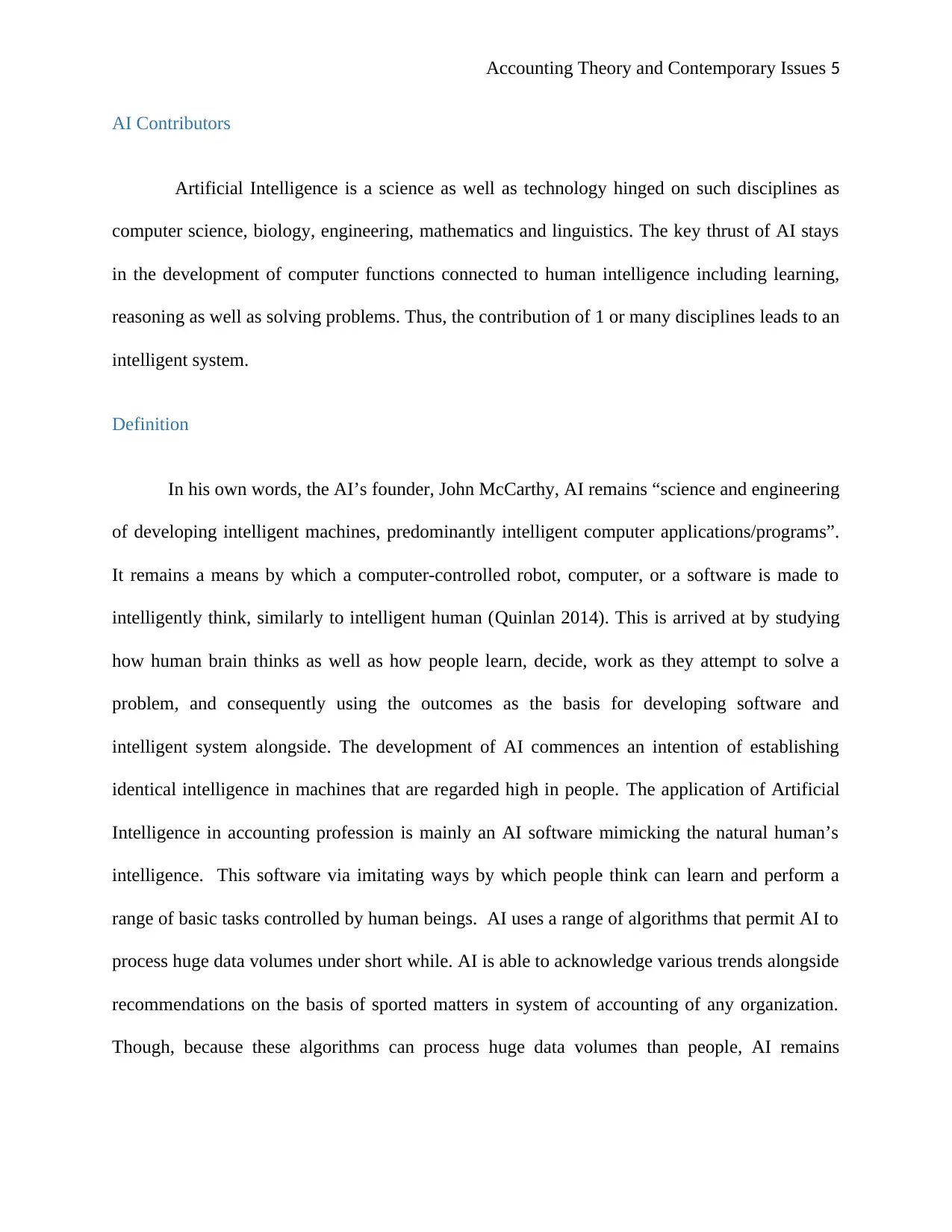
Accounting Theory and Contemporary Issues 5
AI Contributors
Artificial Intelligence is a science as well as technology hinged on such disciplines as
computer science, biology, engineering, mathematics and linguistics. The key thrust of AI stays
in the development of computer functions connected to human intelligence including learning,
reasoning as well as solving problems. Thus, the contribution of 1 or many disciplines leads to an
intelligent system.
Definition
In his own words, the AI’s founder, John McCarthy, AI remains “science and engineering
of developing intelligent machines, predominantly intelligent computer applications/programs”.
It remains a means by which a computer-controlled robot, computer, or a software is made to
intelligently think, similarly to intelligent human (Quinlan 2014). This is arrived at by studying
how human brain thinks as well as how people learn, decide, work as they attempt to solve a
problem, and consequently using the outcomes as the basis for developing software and
intelligent system alongside. The development of AI commences an intention of establishing
identical intelligence in machines that are regarded high in people. The application of Artificial
Intelligence in accounting profession is mainly an AI software mimicking the natural human’s
intelligence. This software via imitating ways by which people think can learn and perform a
range of basic tasks controlled by human beings. AI uses a range of algorithms that permit AI to
process huge data volumes under short while. AI is able to acknowledge various trends alongside
recommendations on the basis of sported matters in system of accounting of any organization.
Though, because these algorithms can process huge data volumes than people, AI remains
AI Contributors
Artificial Intelligence is a science as well as technology hinged on such disciplines as
computer science, biology, engineering, mathematics and linguistics. The key thrust of AI stays
in the development of computer functions connected to human intelligence including learning,
reasoning as well as solving problems. Thus, the contribution of 1 or many disciplines leads to an
intelligent system.
Definition
In his own words, the AI’s founder, John McCarthy, AI remains “science and engineering
of developing intelligent machines, predominantly intelligent computer applications/programs”.
It remains a means by which a computer-controlled robot, computer, or a software is made to
intelligently think, similarly to intelligent human (Quinlan 2014). This is arrived at by studying
how human brain thinks as well as how people learn, decide, work as they attempt to solve a
problem, and consequently using the outcomes as the basis for developing software and
intelligent system alongside. The development of AI commences an intention of establishing
identical intelligence in machines that are regarded high in people. The application of Artificial
Intelligence in accounting profession is mainly an AI software mimicking the natural human’s
intelligence. This software via imitating ways by which people think can learn and perform a
range of basic tasks controlled by human beings. AI uses a range of algorithms that permit AI to
process huge data volumes under short while. AI is able to acknowledge various trends alongside
recommendations on the basis of sported matters in system of accounting of any organization.
Though, because these algorithms can process huge data volumes than people, AI remains
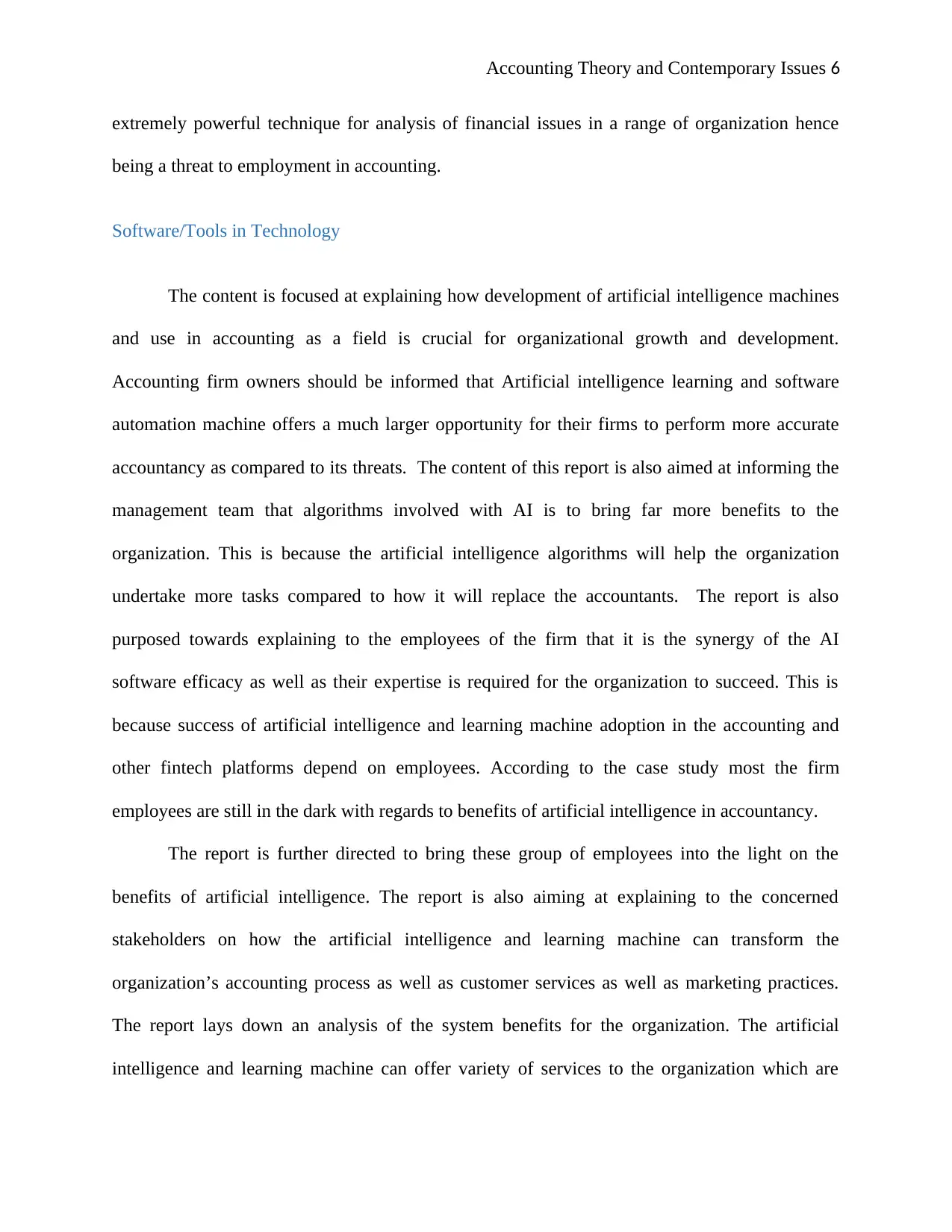
Accounting Theory and Contemporary Issues 6
extremely powerful technique for analysis of financial issues in a range of organization hence
being a threat to employment in accounting.
Software/Tools in Technology
The content is focused at explaining how development of artificial intelligence machines
and use in accounting as a field is crucial for organizational growth and development.
Accounting firm owners should be informed that Artificial intelligence learning and software
automation machine offers a much larger opportunity for their firms to perform more accurate
accountancy as compared to its threats. The content of this report is also aimed at informing the
management team that algorithms involved with AI is to bring far more benefits to the
organization. This is because the artificial intelligence algorithms will help the organization
undertake more tasks compared to how it will replace the accountants. The report is also
purposed towards explaining to the employees of the firm that it is the synergy of the AI
software efficacy as well as their expertise is required for the organization to succeed. This is
because success of artificial intelligence and learning machine adoption in the accounting and
other fintech platforms depend on employees. According to the case study most the firm
employees are still in the dark with regards to benefits of artificial intelligence in accountancy.
The report is further directed to bring these group of employees into the light on the
benefits of artificial intelligence. The report is also aiming at explaining to the concerned
stakeholders on how the artificial intelligence and learning machine can transform the
organization’s accounting process as well as customer services as well as marketing practices.
The report lays down an analysis of the system benefits for the organization. The artificial
intelligence and learning machine can offer variety of services to the organization which are
extremely powerful technique for analysis of financial issues in a range of organization hence
being a threat to employment in accounting.
Software/Tools in Technology
The content is focused at explaining how development of artificial intelligence machines
and use in accounting as a field is crucial for organizational growth and development.
Accounting firm owners should be informed that Artificial intelligence learning and software
automation machine offers a much larger opportunity for their firms to perform more accurate
accountancy as compared to its threats. The content of this report is also aimed at informing the
management team that algorithms involved with AI is to bring far more benefits to the
organization. This is because the artificial intelligence algorithms will help the organization
undertake more tasks compared to how it will replace the accountants. The report is also
purposed towards explaining to the employees of the firm that it is the synergy of the AI
software efficacy as well as their expertise is required for the organization to succeed. This is
because success of artificial intelligence and learning machine adoption in the accounting and
other fintech platforms depend on employees. According to the case study most the firm
employees are still in the dark with regards to benefits of artificial intelligence in accountancy.
The report is further directed to bring these group of employees into the light on the
benefits of artificial intelligence. The report is also aiming at explaining to the concerned
stakeholders on how the artificial intelligence and learning machine can transform the
organization’s accounting process as well as customer services as well as marketing practices.
The report lays down an analysis of the system benefits for the organization. The artificial
intelligence and learning machine can offer variety of services to the organization which are
⊘ This is a preview!⊘
Do you want full access?
Subscribe today to unlock all pages.

Trusted by 1+ million students worldwide
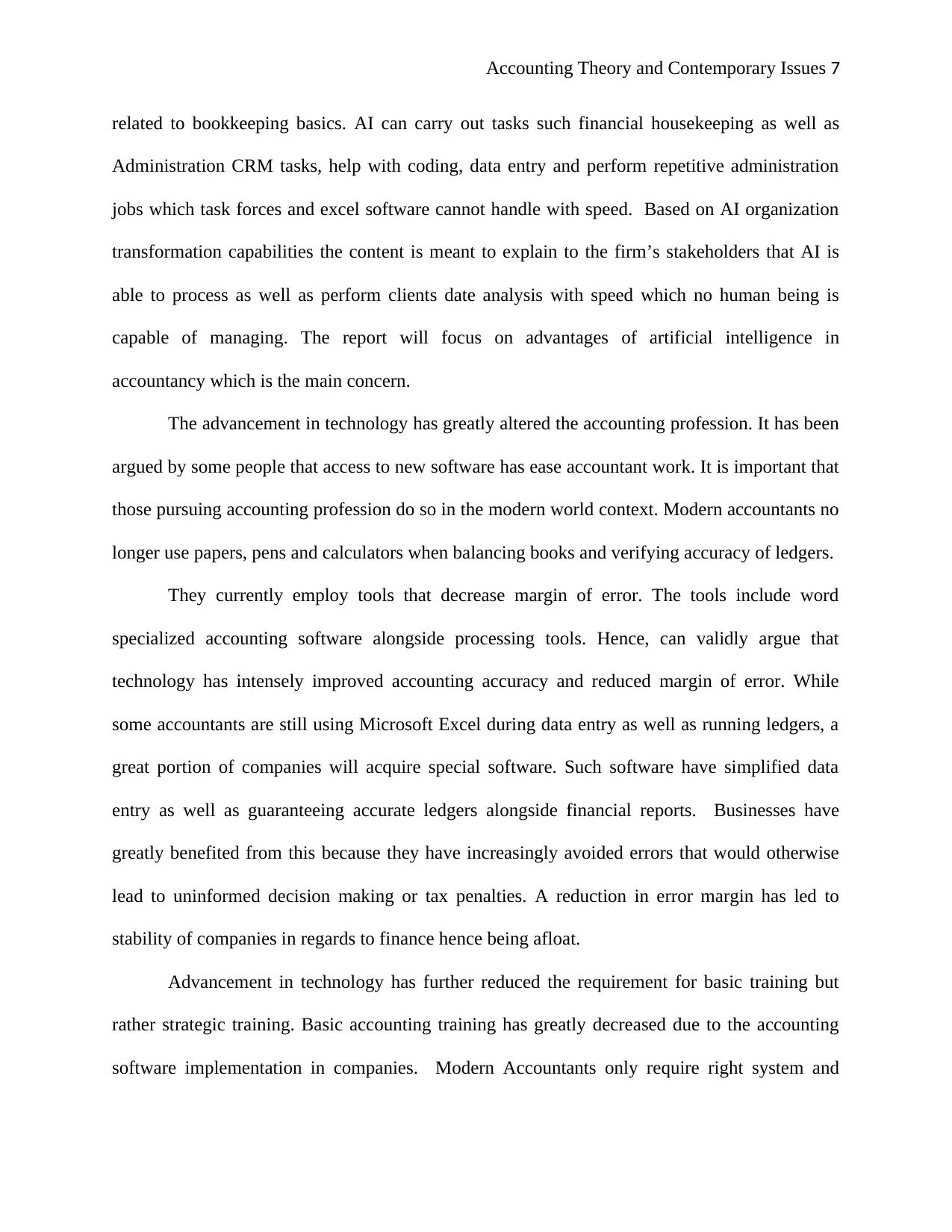
Accounting Theory and Contemporary Issues 7
related to bookkeeping basics. AI can carry out tasks such financial housekeeping as well as
Administration CRM tasks, help with coding, data entry and perform repetitive administration
jobs which task forces and excel software cannot handle with speed. Based on AI organization
transformation capabilities the content is meant to explain to the firm’s stakeholders that AI is
able to process as well as perform clients date analysis with speed which no human being is
capable of managing. The report will focus on advantages of artificial intelligence in
accountancy which is the main concern.
The advancement in technology has greatly altered the accounting profession. It has been
argued by some people that access to new software has ease accountant work. It is important that
those pursuing accounting profession do so in the modern world context. Modern accountants no
longer use papers, pens and calculators when balancing books and verifying accuracy of ledgers.
They currently employ tools that decrease margin of error. The tools include word
specialized accounting software alongside processing tools. Hence, can validly argue that
technology has intensely improved accounting accuracy and reduced margin of error. While
some accountants are still using Microsoft Excel during data entry as well as running ledgers, a
great portion of companies will acquire special software. Such software have simplified data
entry as well as guaranteeing accurate ledgers alongside financial reports. Businesses have
greatly benefited from this because they have increasingly avoided errors that would otherwise
lead to uninformed decision making or tax penalties. A reduction in error margin has led to
stability of companies in regards to finance hence being afloat.
Advancement in technology has further reduced the requirement for basic training but
rather strategic training. Basic accounting training has greatly decreased due to the accounting
software implementation in companies. Modern Accountants only require right system and
related to bookkeeping basics. AI can carry out tasks such financial housekeeping as well as
Administration CRM tasks, help with coding, data entry and perform repetitive administration
jobs which task forces and excel software cannot handle with speed. Based on AI organization
transformation capabilities the content is meant to explain to the firm’s stakeholders that AI is
able to process as well as perform clients date analysis with speed which no human being is
capable of managing. The report will focus on advantages of artificial intelligence in
accountancy which is the main concern.
The advancement in technology has greatly altered the accounting profession. It has been
argued by some people that access to new software has ease accountant work. It is important that
those pursuing accounting profession do so in the modern world context. Modern accountants no
longer use papers, pens and calculators when balancing books and verifying accuracy of ledgers.
They currently employ tools that decrease margin of error. The tools include word
specialized accounting software alongside processing tools. Hence, can validly argue that
technology has intensely improved accounting accuracy and reduced margin of error. While
some accountants are still using Microsoft Excel during data entry as well as running ledgers, a
great portion of companies will acquire special software. Such software have simplified data
entry as well as guaranteeing accurate ledgers alongside financial reports. Businesses have
greatly benefited from this because they have increasingly avoided errors that would otherwise
lead to uninformed decision making or tax penalties. A reduction in error margin has led to
stability of companies in regards to finance hence being afloat.
Advancement in technology has further reduced the requirement for basic training but
rather strategic training. Basic accounting training has greatly decreased due to the accounting
software implementation in companies. Modern Accountants only require right system and
Paraphrase This Document
Need a fresh take? Get an instant paraphrase of this document with our AI Paraphraser
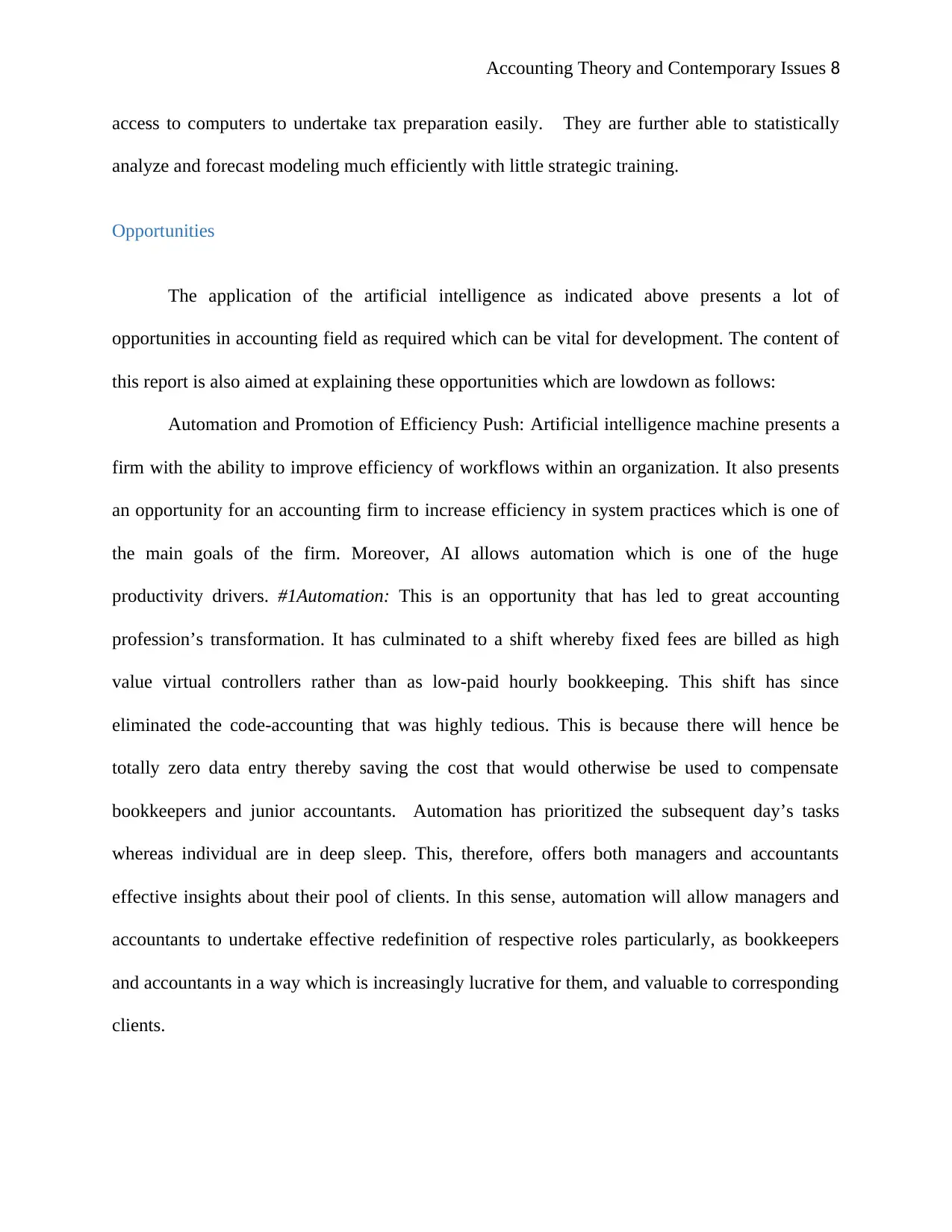
Accounting Theory and Contemporary Issues 8
access to computers to undertake tax preparation easily. They are further able to statistically
analyze and forecast modeling much efficiently with little strategic training.
Opportunities
The application of the artificial intelligence as indicated above presents a lot of
opportunities in accounting field as required which can be vital for development. The content of
this report is also aimed at explaining these opportunities which are lowdown as follows:
Automation and Promotion of Efficiency Push: Artificial intelligence machine presents a
firm with the ability to improve efficiency of workflows within an organization. It also presents
an opportunity for an accounting firm to increase efficiency in system practices which is one of
the main goals of the firm. Moreover, AI allows automation which is one of the huge
productivity drivers. #1Automation: This is an opportunity that has led to great accounting
profession’s transformation. It has culminated to a shift whereby fixed fees are billed as high
value virtual controllers rather than as low-paid hourly bookkeeping. This shift has since
eliminated the code-accounting that was highly tedious. This is because there will hence be
totally zero data entry thereby saving the cost that would otherwise be used to compensate
bookkeepers and junior accountants. Automation has prioritized the subsequent day’s tasks
whereas individual are in deep sleep. This, therefore, offers both managers and accountants
effective insights about their pool of clients. In this sense, automation will allow managers and
accountants to undertake effective redefinition of respective roles particularly, as bookkeepers
and accountants in a way which is increasingly lucrative for them, and valuable to corresponding
clients.
access to computers to undertake tax preparation easily. They are further able to statistically
analyze and forecast modeling much efficiently with little strategic training.
Opportunities
The application of the artificial intelligence as indicated above presents a lot of
opportunities in accounting field as required which can be vital for development. The content of
this report is also aimed at explaining these opportunities which are lowdown as follows:
Automation and Promotion of Efficiency Push: Artificial intelligence machine presents a
firm with the ability to improve efficiency of workflows within an organization. It also presents
an opportunity for an accounting firm to increase efficiency in system practices which is one of
the main goals of the firm. Moreover, AI allows automation which is one of the huge
productivity drivers. #1Automation: This is an opportunity that has led to great accounting
profession’s transformation. It has culminated to a shift whereby fixed fees are billed as high
value virtual controllers rather than as low-paid hourly bookkeeping. This shift has since
eliminated the code-accounting that was highly tedious. This is because there will hence be
totally zero data entry thereby saving the cost that would otherwise be used to compensate
bookkeepers and junior accountants. Automation has prioritized the subsequent day’s tasks
whereas individual are in deep sleep. This, therefore, offers both managers and accountants
effective insights about their pool of clients. In this sense, automation will allow managers and
accountants to undertake effective redefinition of respective roles particularly, as bookkeepers
and accountants in a way which is increasingly lucrative for them, and valuable to corresponding
clients.
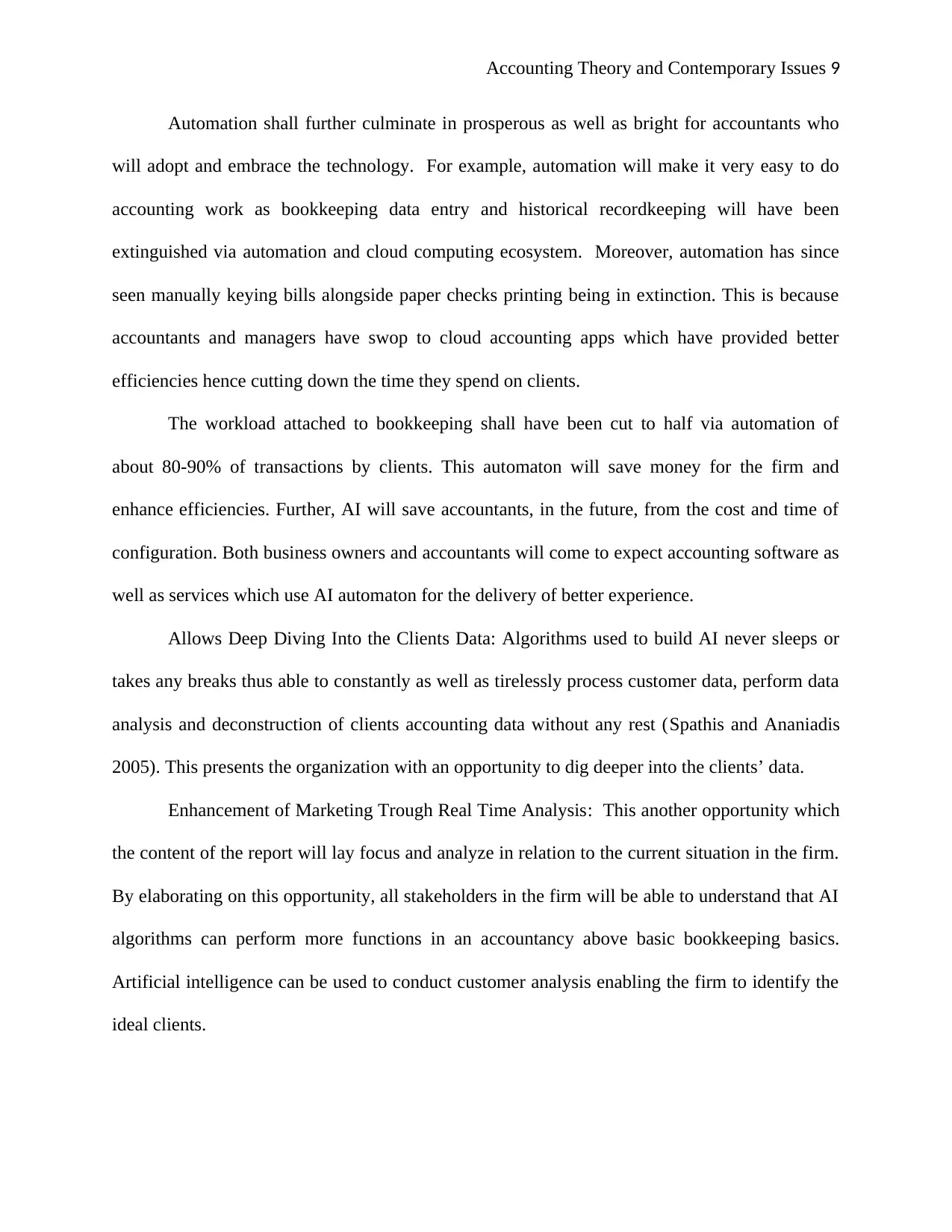
Accounting Theory and Contemporary Issues 9
Automation shall further culminate in prosperous as well as bright for accountants who
will adopt and embrace the technology. For example, automation will make it very easy to do
accounting work as bookkeeping data entry and historical recordkeeping will have been
extinguished via automation and cloud computing ecosystem. Moreover, automation has since
seen manually keying bills alongside paper checks printing being in extinction. This is because
accountants and managers have swop to cloud accounting apps which have provided better
efficiencies hence cutting down the time they spend on clients.
The workload attached to bookkeeping shall have been cut to half via automation of
about 80-90% of transactions by clients. This automaton will save money for the firm and
enhance efficiencies. Further, AI will save accountants, in the future, from the cost and time of
configuration. Both business owners and accountants will come to expect accounting software as
well as services which use AI automaton for the delivery of better experience.
Allows Deep Diving Into the Clients Data: Algorithms used to build AI never sleeps or
takes any breaks thus able to constantly as well as tirelessly process customer data, perform data
analysis and deconstruction of clients accounting data without any rest (Spathis and Ananiadis
2005). This presents the organization with an opportunity to dig deeper into the clients’ data.
Enhancement of Marketing Trough Real Time Analysis: This another opportunity which
the content of the report will lay focus and analyze in relation to the current situation in the firm.
By elaborating on this opportunity, all stakeholders in the firm will be able to understand that AI
algorithms can perform more functions in an accountancy above basic bookkeeping basics.
Artificial intelligence can be used to conduct customer analysis enabling the firm to identify the
ideal clients.
Automation shall further culminate in prosperous as well as bright for accountants who
will adopt and embrace the technology. For example, automation will make it very easy to do
accounting work as bookkeeping data entry and historical recordkeeping will have been
extinguished via automation and cloud computing ecosystem. Moreover, automation has since
seen manually keying bills alongside paper checks printing being in extinction. This is because
accountants and managers have swop to cloud accounting apps which have provided better
efficiencies hence cutting down the time they spend on clients.
The workload attached to bookkeeping shall have been cut to half via automation of
about 80-90% of transactions by clients. This automaton will save money for the firm and
enhance efficiencies. Further, AI will save accountants, in the future, from the cost and time of
configuration. Both business owners and accountants will come to expect accounting software as
well as services which use AI automaton for the delivery of better experience.
Allows Deep Diving Into the Clients Data: Algorithms used to build AI never sleeps or
takes any breaks thus able to constantly as well as tirelessly process customer data, perform data
analysis and deconstruction of clients accounting data without any rest (Spathis and Ananiadis
2005). This presents the organization with an opportunity to dig deeper into the clients’ data.
Enhancement of Marketing Trough Real Time Analysis: This another opportunity which
the content of the report will lay focus and analyze in relation to the current situation in the firm.
By elaborating on this opportunity, all stakeholders in the firm will be able to understand that AI
algorithms can perform more functions in an accountancy above basic bookkeeping basics.
Artificial intelligence can be used to conduct customer analysis enabling the firm to identify the
ideal clients.
⊘ This is a preview!⊘
Do you want full access?
Subscribe today to unlock all pages.

Trusted by 1+ million students worldwide
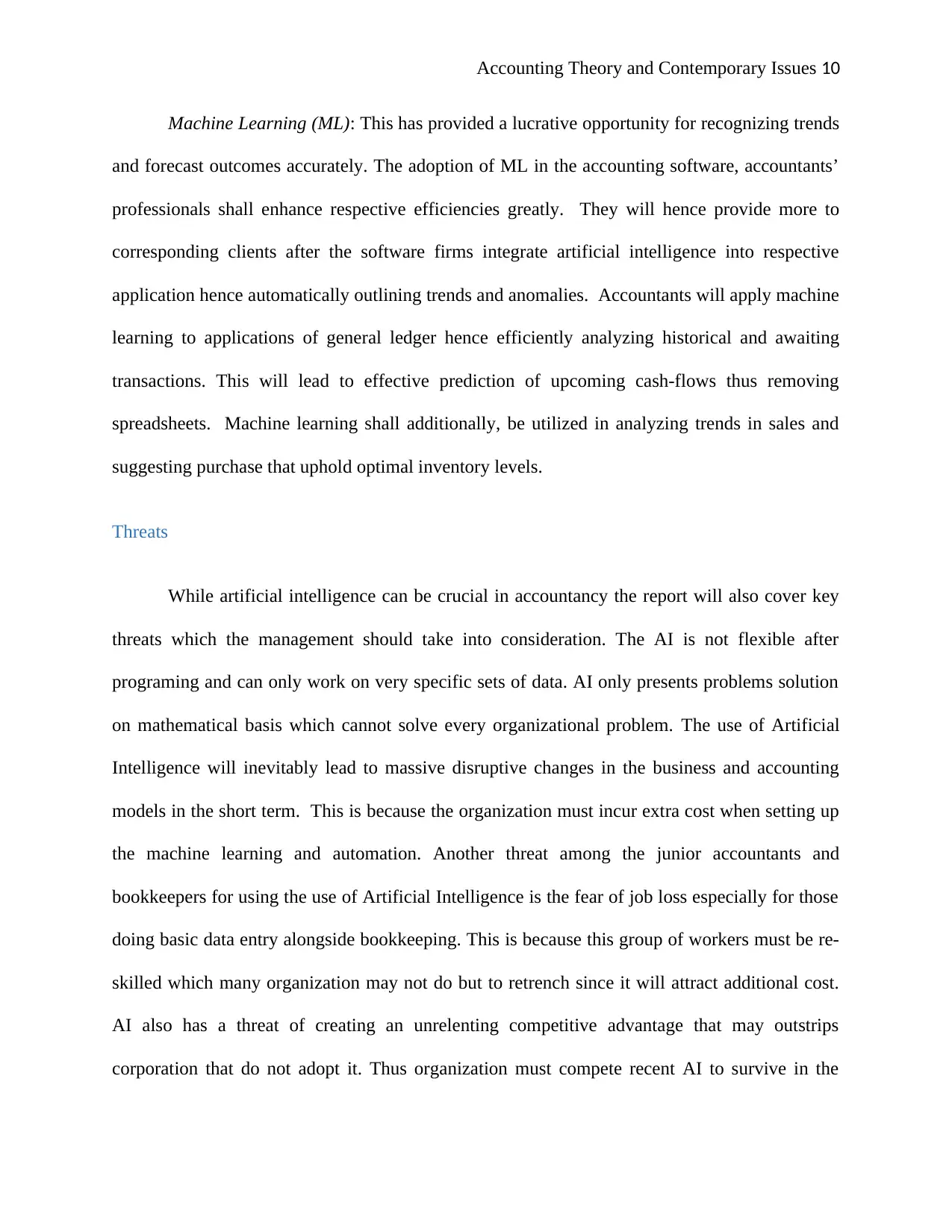
Accounting Theory and Contemporary Issues 10
Machine Learning (ML): This has provided a lucrative opportunity for recognizing trends
and forecast outcomes accurately. The adoption of ML in the accounting software, accountants’
professionals shall enhance respective efficiencies greatly. They will hence provide more to
corresponding clients after the software firms integrate artificial intelligence into respective
application hence automatically outlining trends and anomalies. Accountants will apply machine
learning to applications of general ledger hence efficiently analyzing historical and awaiting
transactions. This will lead to effective prediction of upcoming cash-flows thus removing
spreadsheets. Machine learning shall additionally, be utilized in analyzing trends in sales and
suggesting purchase that uphold optimal inventory levels.
Threats
While artificial intelligence can be crucial in accountancy the report will also cover key
threats which the management should take into consideration. The AI is not flexible after
programing and can only work on very specific sets of data. AI only presents problems solution
on mathematical basis which cannot solve every organizational problem. The use of Artificial
Intelligence will inevitably lead to massive disruptive changes in the business and accounting
models in the short term. This is because the organization must incur extra cost when setting up
the machine learning and automation. Another threat among the junior accountants and
bookkeepers for using the use of Artificial Intelligence is the fear of job loss especially for those
doing basic data entry alongside bookkeeping. This is because this group of workers must be re-
skilled which many organization may not do but to retrench since it will attract additional cost.
AI also has a threat of creating an unrelenting competitive advantage that may outstrips
corporation that do not adopt it. Thus organization must compete recent AI to survive in the
Machine Learning (ML): This has provided a lucrative opportunity for recognizing trends
and forecast outcomes accurately. The adoption of ML in the accounting software, accountants’
professionals shall enhance respective efficiencies greatly. They will hence provide more to
corresponding clients after the software firms integrate artificial intelligence into respective
application hence automatically outlining trends and anomalies. Accountants will apply machine
learning to applications of general ledger hence efficiently analyzing historical and awaiting
transactions. This will lead to effective prediction of upcoming cash-flows thus removing
spreadsheets. Machine learning shall additionally, be utilized in analyzing trends in sales and
suggesting purchase that uphold optimal inventory levels.
Threats
While artificial intelligence can be crucial in accountancy the report will also cover key
threats which the management should take into consideration. The AI is not flexible after
programing and can only work on very specific sets of data. AI only presents problems solution
on mathematical basis which cannot solve every organizational problem. The use of Artificial
Intelligence will inevitably lead to massive disruptive changes in the business and accounting
models in the short term. This is because the organization must incur extra cost when setting up
the machine learning and automation. Another threat among the junior accountants and
bookkeepers for using the use of Artificial Intelligence is the fear of job loss especially for those
doing basic data entry alongside bookkeeping. This is because this group of workers must be re-
skilled which many organization may not do but to retrench since it will attract additional cost.
AI also has a threat of creating an unrelenting competitive advantage that may outstrips
corporation that do not adopt it. Thus organization must compete recent AI to survive in the
Paraphrase This Document
Need a fresh take? Get an instant paraphrase of this document with our AI Paraphraser
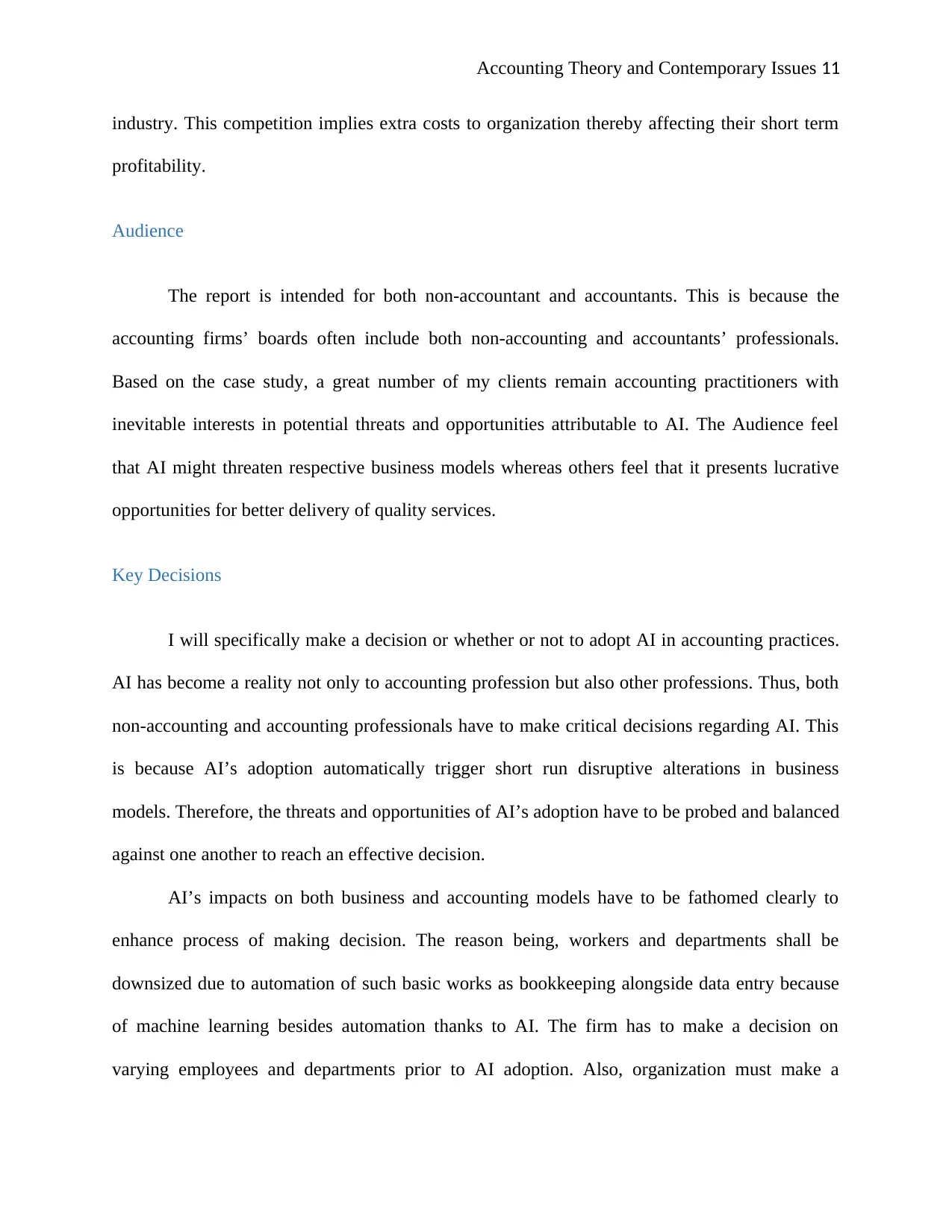
Accounting Theory and Contemporary Issues 11
industry. This competition implies extra costs to organization thereby affecting their short term
profitability.
Audience
The report is intended for both non-accountant and accountants. This is because the
accounting firms’ boards often include both non-accounting and accountants’ professionals.
Based on the case study, a great number of my clients remain accounting practitioners with
inevitable interests in potential threats and opportunities attributable to AI. The Audience feel
that AI might threaten respective business models whereas others feel that it presents lucrative
opportunities for better delivery of quality services.
Key Decisions
I will specifically make a decision or whether or not to adopt AI in accounting practices.
AI has become a reality not only to accounting profession but also other professions. Thus, both
non-accounting and accounting professionals have to make critical decisions regarding AI. This
is because AI’s adoption automatically trigger short run disruptive alterations in business
models. Therefore, the threats and opportunities of AI’s adoption have to be probed and balanced
against one another to reach an effective decision.
AI’s impacts on both business and accounting models have to be fathomed clearly to
enhance process of making decision. The reason being, workers and departments shall be
downsized due to automation of such basic works as bookkeeping alongside data entry because
of machine learning besides automation thanks to AI. The firm has to make a decision on
varying employees and departments prior to AI adoption. Also, organization must make a
industry. This competition implies extra costs to organization thereby affecting their short term
profitability.
Audience
The report is intended for both non-accountant and accountants. This is because the
accounting firms’ boards often include both non-accounting and accountants’ professionals.
Based on the case study, a great number of my clients remain accounting practitioners with
inevitable interests in potential threats and opportunities attributable to AI. The Audience feel
that AI might threaten respective business models whereas others feel that it presents lucrative
opportunities for better delivery of quality services.
Key Decisions
I will specifically make a decision or whether or not to adopt AI in accounting practices.
AI has become a reality not only to accounting profession but also other professions. Thus, both
non-accounting and accounting professionals have to make critical decisions regarding AI. This
is because AI’s adoption automatically trigger short run disruptive alterations in business
models. Therefore, the threats and opportunities of AI’s adoption have to be probed and balanced
against one another to reach an effective decision.
AI’s impacts on both business and accounting models have to be fathomed clearly to
enhance process of making decision. The reason being, workers and departments shall be
downsized due to automation of such basic works as bookkeeping alongside data entry because
of machine learning besides automation thanks to AI. The firm has to make a decision on
varying employees and departments prior to AI adoption. Also, organization must make a
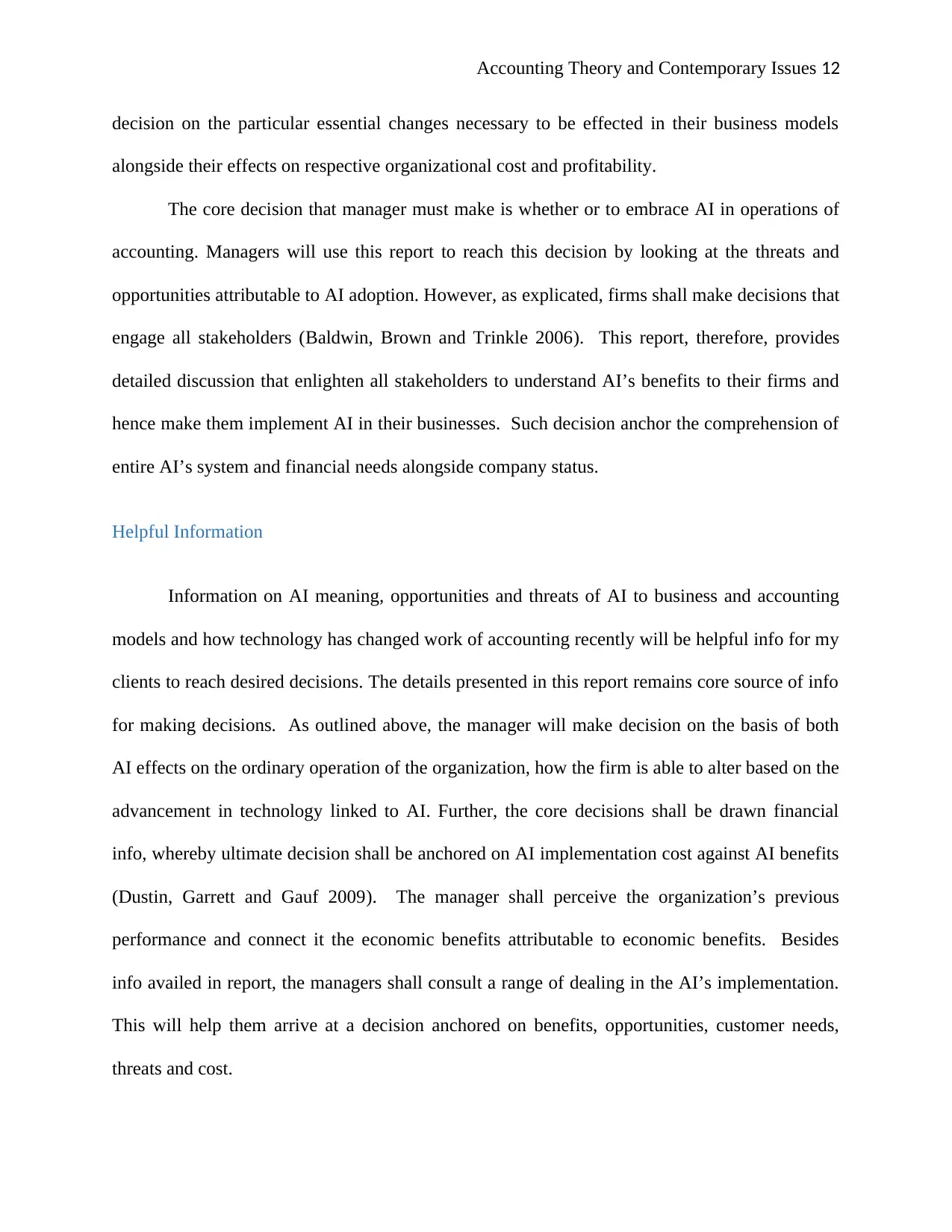
Accounting Theory and Contemporary Issues 12
decision on the particular essential changes necessary to be effected in their business models
alongside their effects on respective organizational cost and profitability.
The core decision that manager must make is whether or to embrace AI in operations of
accounting. Managers will use this report to reach this decision by looking at the threats and
opportunities attributable to AI adoption. However, as explicated, firms shall make decisions that
engage all stakeholders (Baldwin, Brown and Trinkle 2006). This report, therefore, provides
detailed discussion that enlighten all stakeholders to understand AI’s benefits to their firms and
hence make them implement AI in their businesses. Such decision anchor the comprehension of
entire AI’s system and financial needs alongside company status.
Helpful Information
Information on AI meaning, opportunities and threats of AI to business and accounting
models and how technology has changed work of accounting recently will be helpful info for my
clients to reach desired decisions. The details presented in this report remains core source of info
for making decisions. As outlined above, the manager will make decision on the basis of both
AI effects on the ordinary operation of the organization, how the firm is able to alter based on the
advancement in technology linked to AI. Further, the core decisions shall be drawn financial
info, whereby ultimate decision shall be anchored on AI implementation cost against AI benefits
(Dustin, Garrett and Gauf 2009). The manager shall perceive the organization’s previous
performance and connect it the economic benefits attributable to economic benefits. Besides
info availed in report, the managers shall consult a range of dealing in the AI’s implementation.
This will help them arrive at a decision anchored on benefits, opportunities, customer needs,
threats and cost.
decision on the particular essential changes necessary to be effected in their business models
alongside their effects on respective organizational cost and profitability.
The core decision that manager must make is whether or to embrace AI in operations of
accounting. Managers will use this report to reach this decision by looking at the threats and
opportunities attributable to AI adoption. However, as explicated, firms shall make decisions that
engage all stakeholders (Baldwin, Brown and Trinkle 2006). This report, therefore, provides
detailed discussion that enlighten all stakeholders to understand AI’s benefits to their firms and
hence make them implement AI in their businesses. Such decision anchor the comprehension of
entire AI’s system and financial needs alongside company status.
Helpful Information
Information on AI meaning, opportunities and threats of AI to business and accounting
models and how technology has changed work of accounting recently will be helpful info for my
clients to reach desired decisions. The details presented in this report remains core source of info
for making decisions. As outlined above, the manager will make decision on the basis of both
AI effects on the ordinary operation of the organization, how the firm is able to alter based on the
advancement in technology linked to AI. Further, the core decisions shall be drawn financial
info, whereby ultimate decision shall be anchored on AI implementation cost against AI benefits
(Dustin, Garrett and Gauf 2009). The manager shall perceive the organization’s previous
performance and connect it the economic benefits attributable to economic benefits. Besides
info availed in report, the managers shall consult a range of dealing in the AI’s implementation.
This will help them arrive at a decision anchored on benefits, opportunities, customer needs,
threats and cost.
⊘ This is a preview!⊘
Do you want full access?
Subscribe today to unlock all pages.

Trusted by 1+ million students worldwide
1 out of 16
Related Documents
Your All-in-One AI-Powered Toolkit for Academic Success.
+13062052269
info@desklib.com
Available 24*7 on WhatsApp / Email
![[object Object]](/_next/static/media/star-bottom.7253800d.svg)
Unlock your academic potential
Copyright © 2020–2026 A2Z Services. All Rights Reserved. Developed and managed by ZUCOL.





